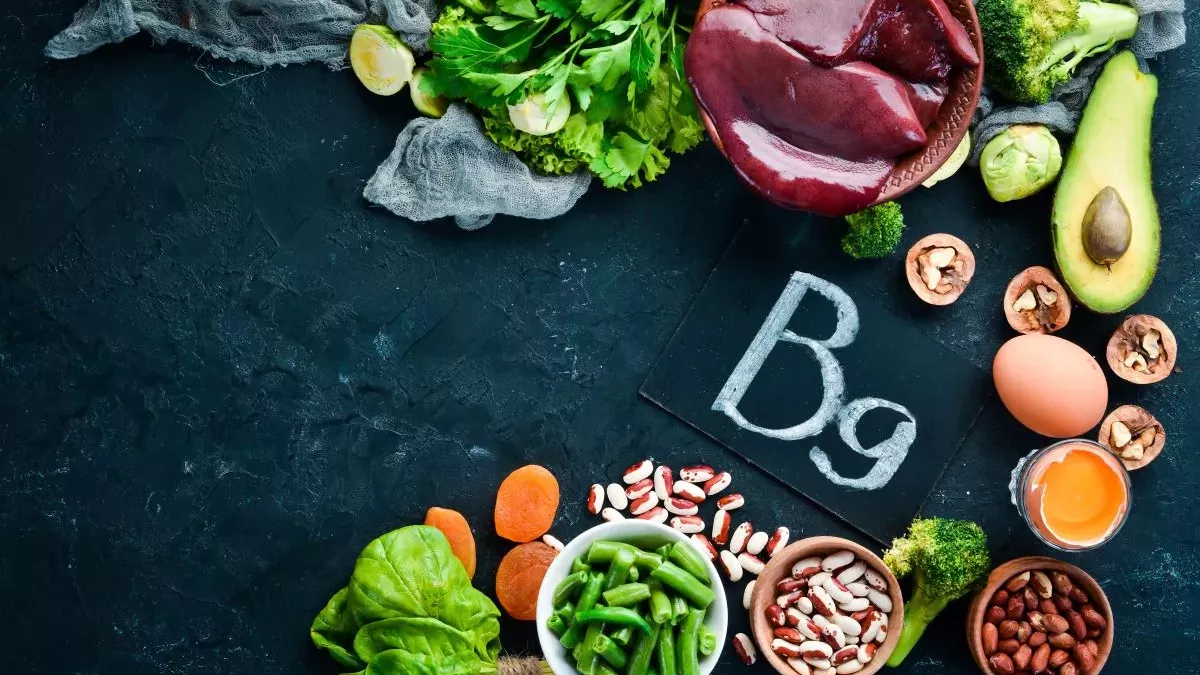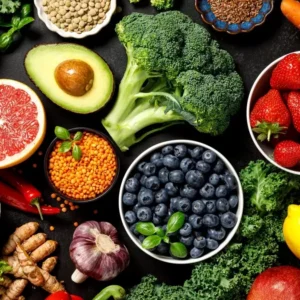Verified on 12/19/2023 by PasseportSanté
Vitamin B9, or folic acid, is a key vitamin during pregnancy. A deficiency can cause serious malformations of the fetus and a risk of premature birth. Outside of this particular period, folates have an equally essential role in the body, particularly in cell maturation and renewal.
Characteristics of vitamin B9:
- water-soluble vitamin not synthesized by the body;
- essential role in cell renewal and red blood cell synthesis;
- found mostly in liver and leafy green vegetables;
- increased folate requirements during pregnancy;
- Vitamin B9 deficiency can be responsible for fetal malformations, Spina Bifida and megaloblastic anemia.
In what foods is vitamin B9 found?
Vitamin B9 is mainly found in offal, legumes and certain green vegetables. Here is a list of the 20 foods richest in folic acid:
|
Food |
Portions |
(µg) |
|
Poultry offal, grilled or braised |
100 g |
345-770 µg |
|
Lamb or veal liver, sautéed |
100 g |
331-400 µg |
|
Cooked legumes |
100 g |
229-368 µg |
|
Pork or beef liver, braised or sautéed |
100 g |
163-260 µg |
|
Boiled spinach |
125ml (1/2 cup) |
139 µg |
|
Boiled asparagus |
125ml (1/2 cup) |
134 µg |
|
Enriched pasta, cooked |
125ml (1/2 cup) |
120-125 µg |
|
Soy beans, boiled or stir-fried |
125ml (1/2 cup) |
83-106 µg |
|
Boiled broccoli |
125ml (1/2 cup) |
89 µg |
|
Roasted sunflower seeds |
60ml (1/4 cup) |
81 µg |
|
Romaine lettuce |
250ml (1 cup) |
80 µg |
|
Sunflower seed butter |
30 ml (2 tbsp) |
77 µg |
|
Cooked beets |
125ml (1/2 cup) |
72 µg |
|
Sprouted soy beans |
125ml (1/2 cup) |
64 µg |
|
Raw spinach |
250ml (1 cup) |
61 µg |
|
Jus d’orange |
125ml (1/2 cup) |
58 µg |
|
Cooked Brussels sprouts |
4 choux (80 g) |
50 µg |
|
Okra, boiled |
125ml (1/2 cup) |
39 µg |
|
Walnuts, hazelnuts, filberts, dehydrated, unblanched |
60ml (1/4 cup) |
39 µg |
|
Linseed |
60ml (1/4 cup) |
37 µg |
Vitamin B9: what are the benefits of foods rich in folic acid?
Pregnancy and folate
Due to the link between neural tube defects and folate intake, it is recommended that women planning to become pregnant consume 400 mcg of synthetic folic acid, from fortified foods or supplements, in addition dietary intake of folate. This supplementation should ideally begin 3 months before conception and continue during the first trimester of pregnancy.
Cellular renewal
Vitamin B9 (folic acid) plays an important role in protein metabolism and DNA production. Folic acid is involved in the production of rapidly renewing cells such as white blood cells and red, skin cells, etc.
Vitamin B9, vitamin B12 and cardiovascular protection
These two vitamins could act synergistically to reduce homocysteine levels. We now know that an excess ofhomocysteine in the blood is associated with an increased risk of cardiovascular events. A good intake of vitamins B9 and B12 could then contribute to cardiovascular prevention.
Hair beauty
Folic acid promotes the regeneration of integuments (nails and hair) and stimulates the hair follicle. A good intake of vitamin B9 helps strengthen hair and prevent hair loss.
 Receive every day
Receive every day
advice from our experts
to take care of you

Daily requirements for vitamin B9
Folate requirements change throughout life. Particularly in pregnant women, it is essential to cover the needs which are then increased to avoid poor closure of the neural tube (Spina Bifida) and malformations of the fetus.
|
Recommended nutritional intake (ANC) |
|
|
Babies 0-6 months |
65 µg* |
|
Babies 7-12 months |
80 µg* |
|
Babies 1-3 years old |
120 µg |
|
Children 4-6 years old |
140 µg |
|
Children 7-10 years old |
200 µg |
|
Adolescents 11-14 ans |
270 µg |
|
Adolescents 15-17 ans |
330 µg |
|
Adults 18 and over |
330 µg |
|
Women wishing to procreate and pregnant women |
600 µg* |
|
Breastfeeding women |
500 µg |
*Sufficient intakes
Vitamin B9 food supplements
Vitamin B9 supplementation may be considered to support the immune system, reduce cardiovascular risk or prevent neurological disorders.
In pregnant women, folic acid supplementation must be systematic to avoid fetal malformations and the risk of premature birth. It is then recommended to take 800 micrograms of folic acid per day, including a diet rich in folate.
In other cases, the dosage and duration of supplementation may vary.
Noticed
It is strongly recommended to never exceed 1 mg of folic acid per day and to seek the advice of a doctor.
B9 deficiencies or excessive intake: what are the adverse effects?
Vitamin B9 deficiencies
Vitamin B9 deficiency generally results in macrocytic anemia, nausea, neurological disorders which can lead to dementia or even tissue inflammation. In pregnant women, a vitamin B9 deficiency can have dramatic consequences: Spina Bifida, growth retardation, premature birth, etc. This is why supplementation should be considered even before conception.
Excess folic acid intake
At very high doses, folic acid can become neurotoxic and cause more or less serious disorders of the nervous system. It is recommended never to exceed 1 mg per day in adults without prior medical advice.
Interactions (with other nutrients)
Vitamin B9 seems to act in synergy with vitamin B12, a good intake of these two elements is essential. Certain drug treatments can, however, interact with folic acid and prevent its assimilation. Thus, oral contraceptives or even metothrexate have a negative effect on blood folate levels. In people under treatment, it may then be wise to consider supplementation.
Chemical properties
The crude formula of vitamin B9 is C19H19N7O6, its molar mass is 441.3975 g/mol. It is a water-soluble vitamin with many roles in the body. Folic acid is, in fact, a metabolic precursor of THF, involved in DNA synthesis. In terms of protein metabolism, vitamin B9 allows the synthesis of key amino acids (serine, methionine, etc.).
While plants can synthesize folic acid, animals and humans must necessarily find it in the daily diet to avoid the risk of deficiency.
Nutrient History
It was in 1930 that L. Wills discovered the existence of a severe anemia common to many pregnant women from disadvantaged backgrounds in certain regions of India. The link between diet and this type of megaloblastic anemia is thus established. This form of anemia will be treated by adding yeast to the diet.
Later, researchers managed to isolate vitamin B9 from certain foods (liver, vegetables, etc.). From then on, the study of this nutrient will reveal its numerous roles in cell maturation and renewal.
It was only in 1980 that scientists would be able to establish a precise link between vitamin B9 deficiency and Spina Bifida. These discoveries will quickly give rise to the first recommendations regarding vitamin B9 supplementation during pregnancy.
Our dietitian’s opinion
Vitamin B9, or folic acid, is essential for cell growth and renewal. Apart from the conception period and the first stages of pregnancy during which vitamin B9 supplementation is necessary to ensure proper closure of the fetal neural tube, a varied and balanced diet is generally sufficient to meet the needs. Certain foods such as liver, legumes or even leafy vegetables are excellent sources!
97% Readers found this article helpful And you ?
Was this article useful to you?












